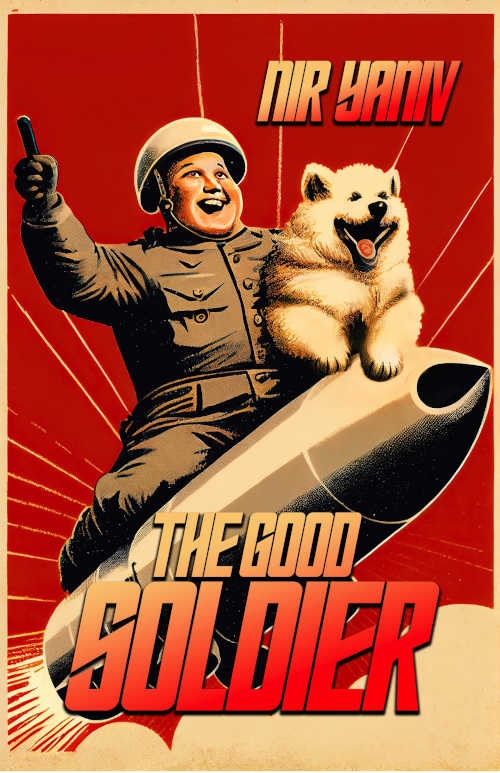90% of military sci-fi is trash, but there’s hope

This author explains why the military science fiction genre is full of books that, to put it charitably, miss the mark.
by Nir Yaniv
Here’s the thing about military science fiction: ninety percent of it is trash.
 Sure, you’ll say, ninety percent of all science fiction is trash. Ninety percent of fantasy, too. Heck, ninety percent of the entire field of literature is trash. And films. And pop music. And, one may add, so are ninety percent of what one had for lunch.
Sure, you’ll say, ninety percent of all science fiction is trash. Ninety percent of fantasy, too. Heck, ninety percent of the entire field of literature is trash. And films. And pop music. And, one may add, so are ninety percent of what one had for lunch.
Fine, I won’t argue. Ninety percent of everything is trash. But not as trashy as ninety percent of military science fiction.
Let us count the ways: The protagonists, who happen to be good. The antagonists, who happen to be bad. The war itself, also bad, the author reminds us, usually while drooling in detail over an extended manifest of futuristic weapons, combat suits, spaceships, robots, implants, bioweapons, and, in some unfortunate cases, rather elaborate insignia.
Books & Buzz Magazine is where writing pros spill their secrets! Subscribe now for free
Then there’s the sci-fi combat. It’s the raison d’etre of military SF, and if anyone tells you otherwise, they probably watch the Fast & Furious films only to learn more about family values. So, space fight: Beams! Energy weapons! Heroism! Sacrifice! The human spirit! War is bad! Ka-boom! Pew pew!
Now, all that is merely the entertaining side of trashy military SF. The less-entertaining side consists of political lectures. Either the army is great, being the source of everything good and decent in society (cough Heinlein cough), or the army is bad but a necessity. Or perhaps it isn’t an army at all, merely a group of people who happen to behave just like an army unit and have very strong opinions about discipline, sacrifice, and the good of society. Either way, lots of opinions are thrown around, while the gentle reader is patiently waiting for the next, hopefully entertaining, space massacre.
At this point, having surely irritated some military SF lovers, and perhaps you, the reader, as collateral damage, I should pause for a moment and mention three facts about myself: First: I like reading (and watching) military SF. Second: my latest novel, The Good Soldier, was just published—its name might hint at its genre. And third: I’ve spent three years of my life in military service. Not as a combatant, thank you very much, but wearing uniforms and living in an army base and obeying my commanders, or at least pretending to do so.
Ninety percent of everything is trash, but not as trashy as ninety percent of military sci-fi.
I’ve learned a thing or two during my service: that the army, while employing some very bright minds, is also home to many idiots. That the system is, for most of the time, largely nonsensical. That having authority rarely reflects a person’s abilities or intelligence. Plus, afterward, whenever I picked up a book about war or army life—any war, any army—I discovered that for most soldiers throughout modern history, the military experience was largely similar to mine.
I first read Catch-22 when I was sixteen. I loved it, but nothing in it was familiar. It was as alien to me as The Martian Chronicles. I read it again during my third year of army service. Suddenly it felt as if every character there was someone I knew. It didn’t matter at all that Catch-22 took place in a U.S. Air Force base in Italy during World War II, while my service was in Israel during the nineties. The people are the same. The army logic, or lack thereof, is the same. The feeling is the same. The system is the same.
And that system, described so well in famous non-SF works such as Catch-22 and M.A.S.H., or the Czech The Good Soldier Švejk, or the Russian The Life and Extraordinary Adventures of Private Ivan Chonkin (I swear this book exists, and it’s hilarious!)—that system hardly exists in modern military SF novels. Sure, there may be unlikeable commanders and the occasional stupid noncom, and some necessary military window dressing, but that’s not it. It doesn’t touch the heart of the matter. Which is not only the system, but also, even mostly, the way people exist within the system, twitch the system, defy the system.
So that’s what I set out to show.
Much like The Good Soldier Švejk—which for some reason isn’t as popular in America as it should be—my protagonist is forced to join the imperial army. Much like Starship Troopers—a novel I like despite myself—he finds himself attached to the mobile infantry, featuring the usual mechanized armor suits and energy weapons and whatnot. But that’s where it veers off into the zany existence of army life. Because no matter what the designers of a given system had in mind, its inhabitants have other ideas. This is true for everything from apartment complexes to schools to cruise ships. But it’s at its harshest, most ludicrous form in the army.
Many of the incidents in the novel echo those that happened to me during my service. No, I never fought aliens (or people, or anything larger than a bee, though it was a rather large bee and, oh, never mind), but I did get a malfunctioning weapon and almost got put in detention after it failed in the firing range. No, I never had a cooking pot explode in zero gravity, but one of my fellow soldiers tried to cook a tin can (of kosher spam—don’t ask) over a fire and almost blinded the lot of us. No, I’m no expert in faulty propulsion systems, but I had my share of badly designed, criminally unsafe military equipment.
And the people … the good-hearted yet powerless young officers, the feared-yet-bored sergeants, and especially the foot soldiers—the hasty ones, the food-obsessed ones, the overzealous ones, the homesick ones … if only I had the time and the scope to tell you about all those people.
Well, that isn’t true, is it? I did have the time, I did have the scope. I put it all in my novel. Check it out. After all that slander I’ve just slammed at the subgenre of military SF, perhaps this novel can serve as compensation: either it’ll be as good as I’m saying it is, or it’ll be the final proof that military SF is, in fact, terrible.
As for you, my unique, gentle, intelligent, and compliment-susceptible readers: I salute you!
Nir Yaniv is an Israeli-born multidisciplinary artist living in Los Angeles. He’s an author, musician, illustrator, and filmmaker. Nir founded Israel’s first online science fiction magazine and served as its chief editor for ten years, after which he moved on to editing a printed genre magazine. He collaborated with World Fantasy Award–winning author Lavie Tidhar on two novels, including the “deranged sci-fi extravaganza” (per the Jewish Quarterly) The Tel Aviv Dossier, and his English-language collection The Love Machine & Other Contraptions was published by Infinity Plus in 2012. His most recent Hebrew novel, King of Jerusalem, was published in Israel in 2019. His short stories have appeared in Weird Tales, Apex, and ChiZine, among others.
Visit Nir at his website, and connect with him on Facebook, Instagram, Twitter, and BlueSky.